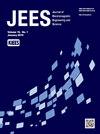A Wideband Ultra-Low-Profile Solar Cell–Integrated Antenna
IF 1.7
3区 工程技术
Q3 ENGINEERING, ELECTRICAL & ELECTRONIC
Journal of electromagnetic engineering and science
Pub Date : 2023-01-31
DOI:10.26866/jees.2023.1.r.143
引用次数: 0
Abstract
In this paper, a wideband ultra-low-profile solar cell–integrated antenna with a high form factor is presented. A copper indium gallium selenide-based solar cell was used for the proposed design. The solar cell was cut with a rectangular-shaped narrow slit to construct a built-in solar cell antenna with dimensions of 50 mm × 20 mm × 0.571 mm (0.382λo × 0.152λo × 0.0043λo at 2.28 GHz). The slit area needed to achieve a high form factor was only 0.5 mm × 18 mm. A coaxial-to-microstrip-line transition type of feeding structure was used to excite the antenna. An RF decoupler circuit was also designed under the second substrate to maintain the independent functioning of both devices. The simulated and measured results are in good agreement. Furthermore, the proposed design demonstrated a –10 dB impedance bandwidth of 42.45% with an ultra-low-profile structure of 0.0043λo at 2.28 GHz, and the maximum gain was 2.84 dBi in the impedance bandwidth range. In addition, the antenna has a high form factor of 99.1%, with no optical blockage.宽带超低剖面太阳能电池-集成天线
本文提出了一种具有高形状因子的宽带超低剖面太阳能电池集成天线。基于铜铟镓硒化物的太阳能电池被用于所提出的设计。用矩形窄缝切割太阳能电池,构建尺寸为50 mm×20 mm×0.571 mm(2.28 GHz时为0.382λo×0.152λo x 0.0043λo)的内置太阳能电池天线。实现高形状因子所需的缝隙面积仅为0.5 mm×18 mm。采用同轴-微带线过渡型馈电结构来激励天线。在第二基板下还设计了RF去耦电路,以保持两个器件的独立功能。模拟结果与实测结果吻合较好。此外,所提出的设计证明,在2.28 GHz下,–10 dB的阻抗带宽为42.45%,具有0.0043λo的超低轮廓结构,在阻抗带宽范围内的最大增益为2.84 dBi。此外,该天线具有99.1%的高形状因数,没有光学阻塞。
本文章由计算机程序翻译,如有差异,请以英文原文为准。
求助全文
约1分钟内获得全文
求助全文
来源期刊

Journal of electromagnetic engineering and science
ENGINEERING, ELECTRICAL & ELECTRONIC-
CiteScore
2.90
自引率
17.40%
发文量
82
审稿时长
10 weeks
期刊介绍:
The Journal of Electromagnetic Engineering and Science (JEES) is an official English-language journal of the Korean Institute of Electromagnetic and Science (KIEES). This journal was launched in 2001 and has been published quarterly since 2003. It is currently registered with the National Research Foundation of Korea and also indexed in Scopus, CrossRef and EBSCO, DOI/Crossref, Google Scholar and Web of Science Core Collection as Emerging Sources Citation Index(ESCI) Journal. The objective of JEES is to publish academic as well as industrial research results and discoveries in electromagnetic engineering and science. The particular scope of the journal includes electromagnetic field theory and its applications: High frequency components, circuits, and systems, Antennas, smart phones, and radars, Electromagnetic wave environments, Relevant industrial developments.
 求助内容:
求助内容: 应助结果提醒方式:
应助结果提醒方式:


